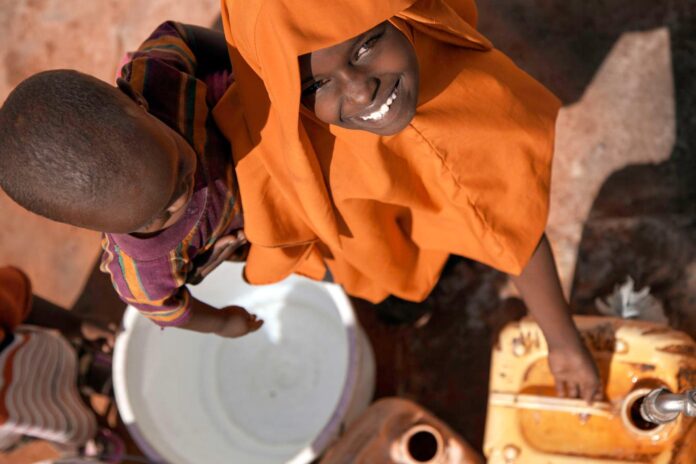Mogadishu (Kaab TV) – The Food and Agriculture Organization of the United Nations (FAO) and the United Nations Children’s Fund (UNICEF) in Somalia, have signed a Memorandum of Understanding (MoU) to further expand their cooperation and effectiveness to improve Somalia’s water security.
The MoU, which has been endorsed by the Federal Ministry of Energy and Water Resources (MoEWR) supports the Water4Life initiative which aims to improve access to safe and adequate water for human consumption and livelihoods, household nutrition, and sustainable community water resource management and rural water supply in Somalia.
“Both agencies have common objectives with regards to safe and adequate water access for rural communities to protect lives and livelihoods,” said FAO Representative in Somalia, Etienne Peterschmitt.
“The MoU will strengthen our efforts for joint advocacy and support in the implementation of MoEWR’s strategy and lay a solid foundation for inter-agency cooperation to achieve the Sustainable Development Goals (SDGs), in particular SDG 6 Clean Water and Sanitation”.
FAO and UNICEF have worked in partnership through past project-specific agreements that include the generation of water source information and mapping for the rural water sector as well as for drought monitoring and humanitarian response, contributing to the UN Common Country Assessment for SDG 6, and management of and access to knowledge resources for rural water.
The two agencies have also enjoyed joint cooperation on the development and implementation of the National Water Resources Strategy (NWRS) and Road Map, the National Water Sector Coordination Facility.
They have worked on joint-programming, alongside WFP, for improving health and nutrition outcomes for children and rural communities under the Joint Resilience Action in Somalia, a multi-agency UN programme framework for ongoing development work and resource mobilization.
“Somalia’s water security needs require an equally ambitious coalition of partners to achieve the great strides laid out in our work plan,” said Minister of Energy and Water Resources, Hon. Mr. Jama Taqal Abbas. “By working together with FAO and UNICEF we’re in a good position to make great strides in our long term strategy for water security in the country,” he said.
Supported by the Ministry of Energy and Water Resources (MoEWR), the partnership contributes to the national water-related development goals as laid out in the NWRS. In addition to the MoU, the partnership has developed a workplan and framework that will define key joint objectives, actions, and roles of each agency towards improving the national water management of Somalia.
“This integrated response will strengthen the programmes that address Somalia’s complex situation where eight million people are in need of water, sanitation and hygiene assistance,” said Wafaa Saeed, UNICEF Somalia Representative. “Together, we can enhance community access to climate adaptive water sources and strengthen their resilience through long-term interventions. All this is done while working closely with MoEWR to build water governance systems.”
Somalia faces acute water insecurity due to a historic drought caused by five consecutive poor rainy seasons, in addition to conflict/insecurity, water-borne disease outbreaks, flooding and exceptionally high food and water prices. Approximately 6.6 million people across Somalia are expected to be facing acute food insecurity through June 2023, with over 49 000 people facing catastrophic food shortages.
As humanitarian aid is expected to scale down starting early 2023 due to insufficient funding and competing global priorities, improved coordination, shared resources, and collaborative efforts from UN agencies is increasingly needed.
Through this partnership, FAO and UNICEF will work to jointly develop and cooperate on humanitarian and development programming to support overall improved water access, use and water management.
The formal partnership, as defined through the MoU, seeks to strengthen cooperation in all aspects of the rural water sector that enhance delivery of WASH and water for the productive rural sectors and human consumption. This includes enhancing rural water supply, rural water management, information management and knowledge generation/communication, and resource mobilization for water-related projects.


